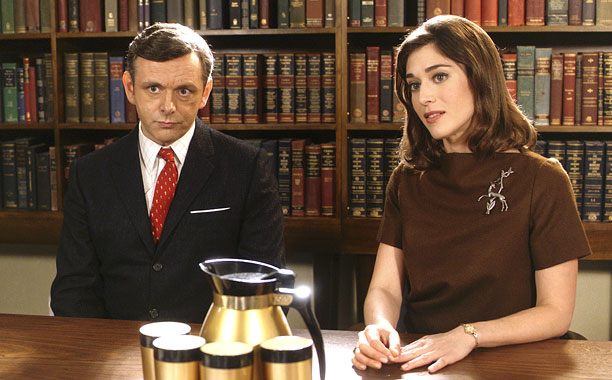Masters of Sex Season 2, Episode 11: “One for the Money, Two for the Show”
Written by Amy Lippman
Directed by Adam Bernstein
Airs Sundays at 10pm (ET) on Showtime
Even to someone who’s bad at taking notice of a lot of production design in film and TV, Bill Masters looks wrong with a regular tie instead of a bow tie. Of course, when he’s put in front of a camera, everything about him feels off. The man’s already extremely uncomfortable in his own skin, and the task of explaining his work to an audience of millions is daunting, to say the least. And that’s before the considerations of national television come into play — censorship (and lots of it), having to “dumb down” his talk without sounding prurient, and most troubling, having to use “creative reenactment” to fill out the story. Bill is obsessed with even the most minute details of how the study is perceived, to the point where even the slightest chance that the public could be misled about it sets him off.
Just as he’s still concealing his bruises from the beating his brother administered to him last week, all this bluster is really Bill still scrambling to compensate for his failings, both those real and imagined. He might have hit his lowest point in the aftermath of that fight, but so far, Bill’s revelation of his monstrosity has led to his resignation towards being a monster. In a separate storyline, Flo pointedly asks, “When has self-awareness ever changed a person’s behavior?” and that’s what Bill struggles with.
One character who defies that defeatist mindset is Libby, who finally consummates a season’s worth of sexual tension with Robert. It’s been a strange, often frustrating road for her this season, but the payoff is a relief, at least. Libby’s relationship to Robert and her ambiguous (to say the least) connection to the cause he’s passionately fighting for wraps their pairing in a lot of racial tangles, the kind that I, as an extremely white person, feel barely qualified to unpack. Before they kiss, Robert even says that it’s a cliché for white women who feel bad about themselves to view black men as “suitable” for them. But then he goes with it anyway. Is the show indulging the “white woman dissatisfied with her marriage finds solace in the arms of the seductive black other” trope? Possibly?
Still, no Libby storyline will ever top one that involves Flo in terms of strangeness. The diet pill lady makes Austin play-act a riff on Gone With the Wind‘s infamous “ravishing” scene. She’s felt like a Rhett for too long, and now she wants to be a Scarlett, and dive into the fantasy of being wanted so badly that nothing will stop a man from taking her. Of course, there’s the obvious irony that she’s forcing Austin to go through with all of this in the first place. The show is wisely taking an extreme remove from any judgment of the characters, but when some moments seem to be played specifically for laughs, it still rankles, especially since this is a plotline that might not ever be considered if the gender roles were reversed. Although, maybe the show is trying to get us to think about gender dynamics in these kind of scenarios.
Meanwhile, Gini, while a shining star in front of the camera, feels her confidence as a mother crumbling as she realizes how badly her work has diminished her presence in her children’s lives. Her ex-husband finally reappears for the first time since the first season, with a new wife, whom the kids love, in tow. Gini is disturbed by how much she’s missing, and her initial reaction is to try to take legal action to stop her ex from taking the kids on a six-week vacation in Europe. After that, she’s at a loss… until she finds someone else who needs her: Bill, who’s cracking again under the pressure, succumbing to self-pity.
Television, especially that of the modern age, has no shortage of men experiencing crises of masculinity. What separates Masters of Sex from the pack is that one can’t think of a time when this show endorsed it’s main character’s assholish behavior, resulting from his misplaced ideas of what makes a “good man,” even a little bit. Bill Masters is a figure of pity more than anything else, just one person struggling between what he needs, what he wants, and what he thinks he needs and wants. And as he pours out his frustrations to Gini, he expresses bewilderment that she bothers to stick by him, that anyone could ever want him.
That’s a recurring theme in this episode, along with maintaining illusions. Bill feels unwanted, Gini feels unwanted, Flo feels unwanted, Libby feels wanted (or at least noticed) for the first time in a while. There’s a particular desolation in believing that you’re undesirable, and what “One for the Money, Two for the Show” does magnificently is tap into that raw emotion. Next week’s episode is the season finale. This episode doesn’t so much offer up new hope for Bill’s crisis as it does reinforce what we already know: that Gini can at least prop him up, if not save him.







